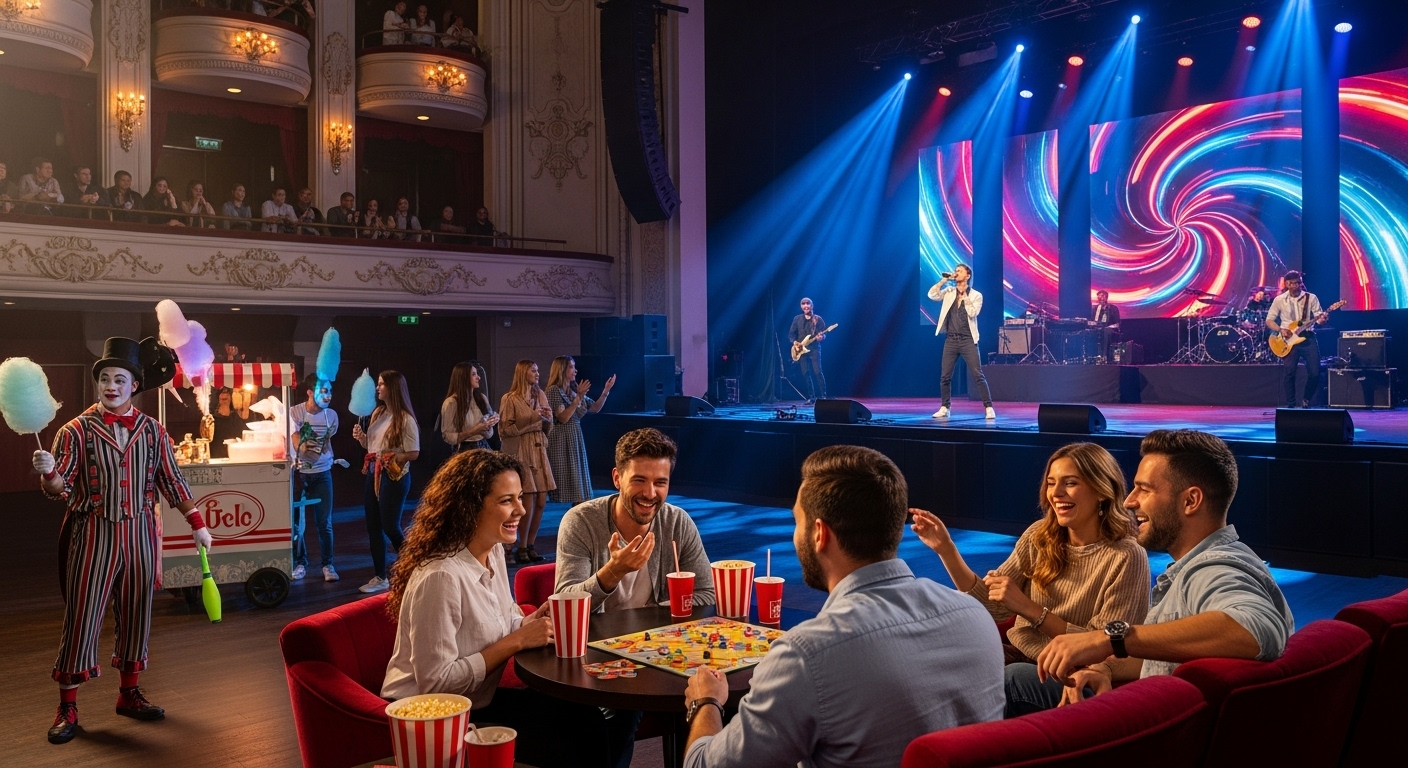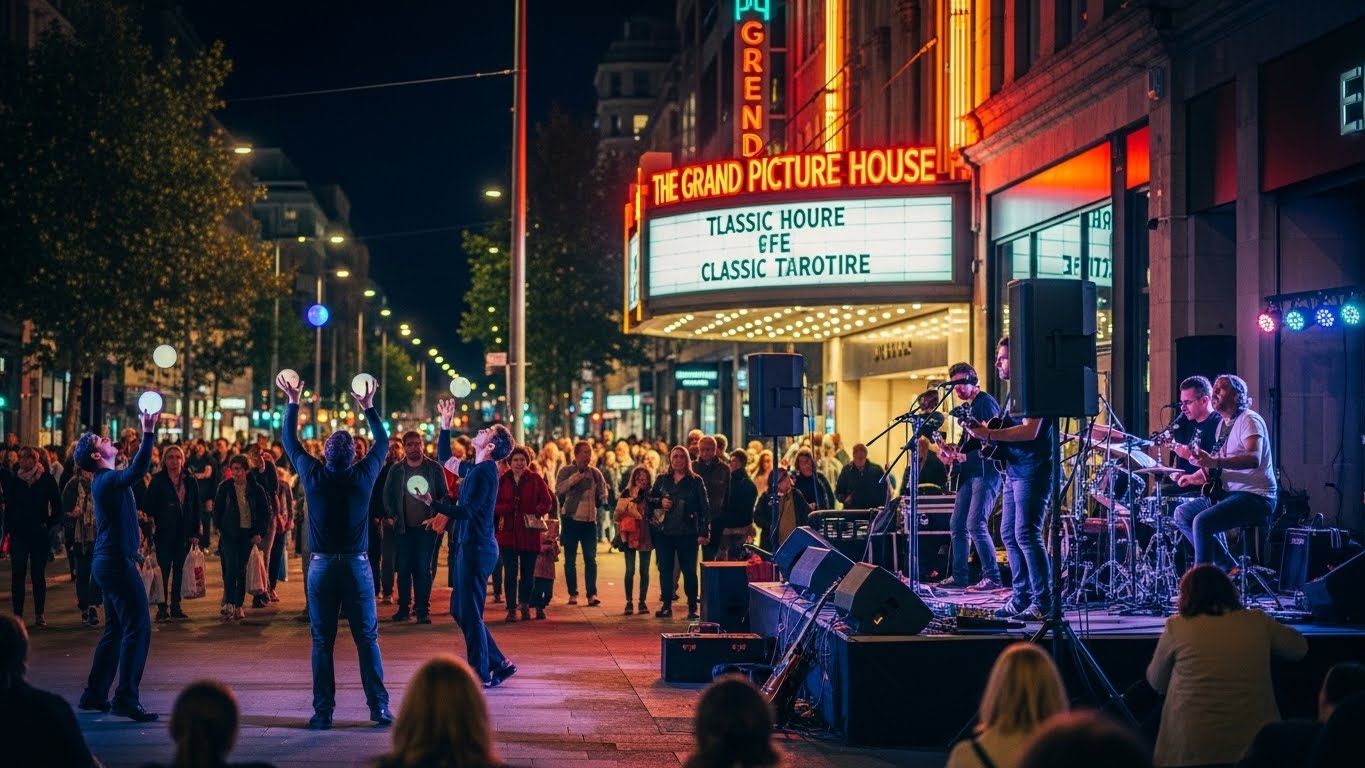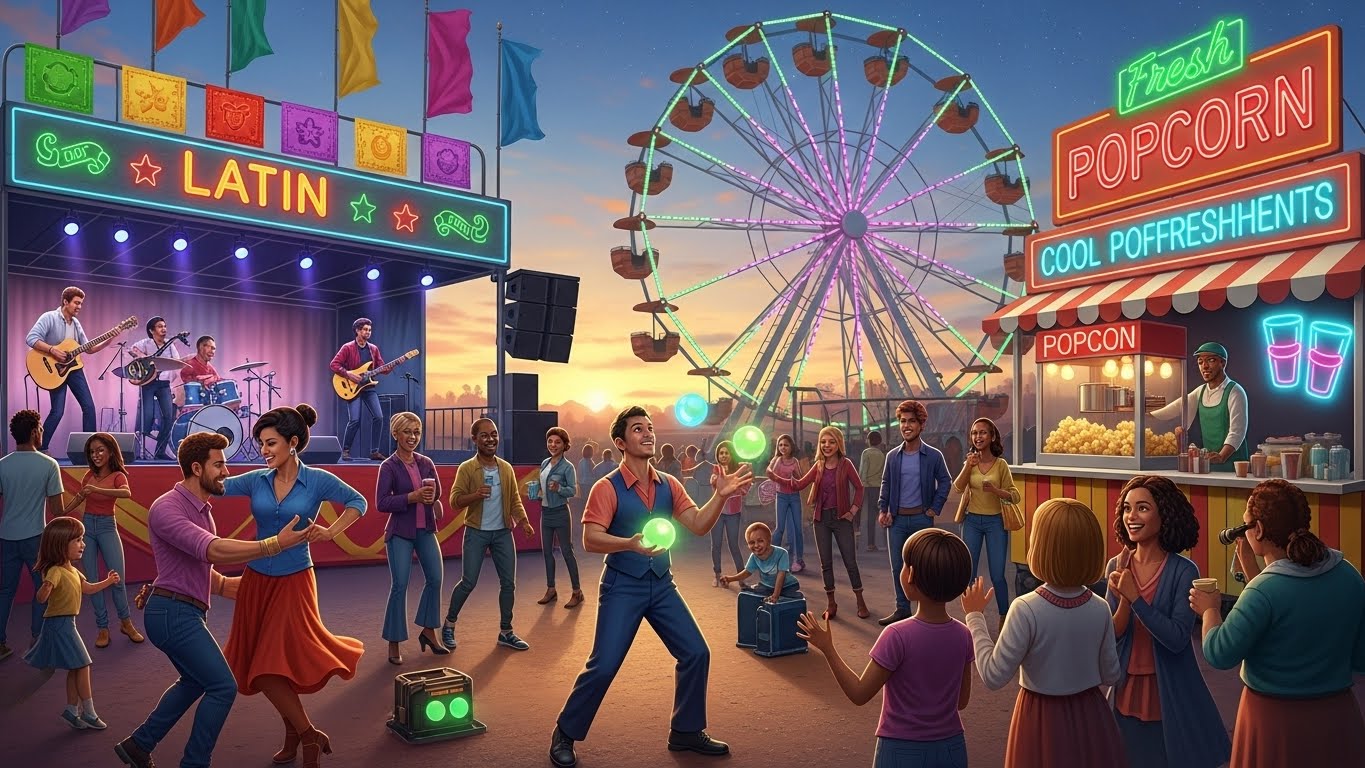Introduction: Entertainment as the Pulse of Society
Entertainment is one of the most powerful forces in human life. It captivates our attention, evokes emotions, and provides a window into experiences beyond our own. From the earliest forms of storytelling to today’s immersive digital experiences, entertainment has always played a crucial role in society. It is more than amusement; it is a reflection of culture, a driver of creativity, and a connector of people across generations and geographies. Entertainment allows us to laugh, cry, imagine, and escape. It mirrors the human experience, providing both a canvas for artists and a playground for audiences.
Across centuries, entertainment has evolved in fascinating ways. It has adapted to technological advances, changing social dynamics, and cultural shifts. From oral storytelling and theater to films, music, video games, and virtual reality, every form of entertainment carries its own unique charm and impact. This blog explores the history, evolution, impact, and future of entertainment, celebrating its endless capacity to inspire and unite.
The Origins of Entertainment: Storytelling and Rituals
Long before modern technology, entertainment existed in its most fundamental form: storytelling. Early humans shared myths, legends, and tales of heroes and gods around fires, passing down wisdom and culture. These stories were not just for leisure—they educated, preserved history, and created communal bonds.
Theater emerged as one of the earliest structured forms of entertainment. Ancient Greece pioneered tragedies and comedies, exploring themes of morality, love, and human struggle. Audiences were captivated by the performance, and playwrights such as Sophocles and Aristophanes left enduring legacies. In Rome, gladiatorial contests combined sport and spectacle, thrilling the masses with displays of strength and courage.
In Asia, traditional performances like puppetry, dance, and musical storytelling flourished. These forms were both artistic and spiritual, reflecting society’s values and beliefs. Entertainment has always served a dual purpose: to amuse and to connect, creating shared experiences that transcend time and culture.
The Evolution of Music and Its Cultural Impact
Music is one of the most universal forms of entertainment, touching the soul in ways words often cannot. From tribal drums and folk songs to symphonies and modern pop, music reflects the human experience. It is a powerful emotional language that transcends cultures and generations.
The 20th century brought revolutionary changes to music. Jazz introduced improvisation and new rhythms, rock and roll captured the spirit of rebellion, and hip-hop provided a platform for cultural expression. Pop icons became global figures, shaping fashion, behavior, and social trends.
Music’s evolution is closely linked with technology. Vinyl records, cassette tapes, CDs, and digital streaming transformed how music was consumed. Today, artists can reach millions instantly, and fans can interact with creators directly. Despite these changes, the core of music remains its ability to move, inspire, and unite people.
The Birth of Cinema and the Art of Storytelling
Cinema transformed entertainment by merging visual art, narrative, and performance. Early silent films captured imaginations, and the advent of sound and color brought stories to life in unprecedented ways. Hollywood’s golden age introduced stars who became cultural icons, and films became an essential part of social life.
Movies offered escape, reflection, and inspiration. They addressed social issues, explored human emotions, and transported audiences to imaginative worlds. Cinema also became a global phenomenon, with industries in India, South Korea, Nigeria, and beyond producing films that resonated across borders.
The digital era has further expanded the reach of cinema. Streaming platforms allow audiences to access content anytime, anywhere. Interactive films and virtual reality experiences are redefining how stories are told, making audiences active participants rather than passive observers.
Television: The Evolution of Home Entertainment
Television revolutionized the way people experienced entertainment. It brought news, drama, comedy, and live events directly into homes. Families gathered around the screen, sharing laughter and suspense, and television became a medium for cultural connection.
Over decades, television evolved from black-and-white broadcasts to color, cable networks, and finally digital streaming. Shows now cater to diverse tastes, from sitcoms and reality programs to documentaries and long-form dramas. Television also influenced society by addressing social issues, promoting awareness, and reflecting cultural shifts.
With streaming, audiences have unprecedented control over what they watch and when they watch it. This flexibility has democratized entertainment, giving independent creators a platform and allowing viewers to explore global content without geographical limitations.
The World of Gaming: Interactive Entertainment
Video games have emerged as one of the most influential forms of modern entertainment. They combine art, storytelling, and interactive experiences in ways that traditional media cannot. Games allow players to explore fantastical worlds, solve complex problems, and engage with communities worldwide.
Esports has turned gaming into a professional arena, with tournaments drawing millions of viewers and players achieving celebrity status. Games also foster creativity, as players design worlds, develop strategies, and participate in collaborative storytelling. Virtual reality and augmented reality are further expanding the immersive potential of gaming, allowing audiences to step into alternate realities.
Gaming’s rise illustrates a shift in entertainment from passive consumption to active participation. Players are no longer just observers—they are creators, competitors, and collaborators, making gaming a dynamic and evolving form of entertainment.
Comedy: The Universal Language of Laughter
Comedy has always been an essential part of entertainment. Humor connects people, provides relief, and reflects societal norms. From the jesters of medieval courts to modern stand-up comedians, comedy offers both amusement and insight.
Comedy can challenge authority, question traditions, and address social issues, all while making audiences laugh. Television shows, films, online sketches, and live performances have made comedy accessible to global audiences. In times of hardship, comedy serves as a source of healing, reminding people to find light even in dark moments.
The digital age has expanded comedy’s reach. Platforms like social media allow comedians to share content instantly, reach international audiences, and interact directly with fans. This accessibility has created a new generation of entertainers who blend humor with creativity and social commentary.
Theatre and Performing Arts: Live Entertainment and Emotional Connection
Theatre remains one of the most powerful forms of entertainment. Live performance creates a unique connection between the performer and the audience. No two performances are the same, and the energy of the moment enhances the emotional impact.
Modern theatre includes musicals, plays, dance, and experimental performances. Technology has enhanced these experiences with advanced lighting, sound, and multimedia integration. Despite digital innovations, the essence of live performance—emotion, presence, and shared experience—remains irreplaceable.
Performing arts continue to inspire creativity, preserve cultural heritage, and explore human emotion. They remind us that entertainment is not just consumption—it is engagement, empathy, and expression.
Digital Platforms and the Democratization of Entertainment
The internet has transformed entertainment into an accessible, interactive, and global experience. Streaming services, social media, and digital content platforms allow creators to share work instantly with worldwide audiences.
Digital platforms have democratized fame and creativity. Independent musicians, filmmakers, and artists can reach millions without relying on traditional studios. Audiences can choose, interact, and even influence content, creating a participatory entertainment ecosystem.
This shift has also expanded diversity in storytelling. Niche genres, cultural narratives, and experimental content now have platforms and audiences, reflecting the multiplicity of human experience. Digital technology ensures that entertainment is no longer confined by geography, budget, or gatekeepers.
The Role of Celebrities and Fan Culture
Celebrities have always been central to entertainment. They embody aspiration, talent, and creativity. In the past, stars were distant figures admired from afar. Today, social media allows fans to connect directly with their favorite entertainers, creating intimate and interactive relationships.
Fans influence trends, support independent creators, and build communities around shared interests. This culture has reshaped the entertainment landscape, making it more dynamic, participatory, and interconnected. Celebrities and fans together form a symbiotic ecosystem that drives creativity, innovation, and cultural conversation.
Technology and the Future of Entertainment
Technology continues to redefine entertainment. Artificial intelligence, virtual reality, augmented reality, and immersive media are transforming how stories are told and experienced. AI can compose music, generate visuals, and even assist in scriptwriting. VR allows audiences to inhabit stories and games in ways that feel real. AR overlays digital elements onto our physical environment, creating hybrid experiences.
The future of entertainment will be immersive, interactive, and personalized. Audiences will not only watch or listen—they will participate, influence, and co-create. Technology expands the possibilities of creativity, enabling experiences that were once limited to imagination.
Cultural Impact and Global Connectivity
Entertainment shapes society. Films, music, games, and performances reflect cultural values, inspire change, and foster understanding. They promote empathy, awareness, and cross-cultural communication. Entertainment can challenge norms, highlight social issues, and celebrate diversity.
Globalization has amplified this impact. A song, film, or video can resonate across continents, connecting audiences with shared emotions and experiences. Entertainment has become a universal language, celebrating the common threads of humanity while embracing differences.
Economic Influence of Entertainment
Entertainment is a significant economic driver, generating revenue and creating employment worldwide. The industry spans film production, music, gaming, live events, and digital content. Streaming platforms, live performances, and brand collaborations contribute to a vast ecosystem that supports artists, technicians, marketers, and producers.
The success of entertainment depends on creativity, innovation, and audience engagement. While technology facilitates production and distribution, the core remains storytelling and emotional resonance. Sustainable growth balances commercial interests with artistic integrity, ensuring that entertainment continues to inspire and engage.
Conclusion: The Enduring Magic of Entertainment
Entertainment is more than diversion—it is a reflection of human imagination, emotion, and culture. From ancient storytelling to cutting-edge virtual experiences, it has always evolved while preserving its core purpose: to move, connect, and inspire.
It celebrates life’s highs and lows, unites communities, and provides spaces for creativity and expression. Entertainment is the mirror in which humanity sees itself, the stage where emotions unfold, and the canvas where imagination knows no bounds.
As technology advances, the forms of entertainment may change, but its essence will remain timeless. It is the eternal thread that connects people, cultures, and generations. The world of entertainment is infinite, ever-evolving, and endlessly inspiring—a testament to humanity’s enduring love for stories, music, performance, and joy.



